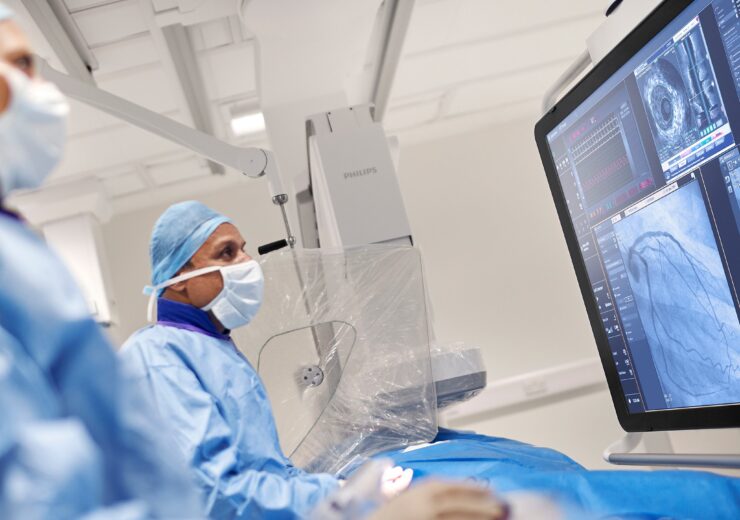The Dynamic Coronary Roadmap lowered the number of angiograms in each procedure on average by three runs based on a procedure with an average of 11 runs or a reduction of 26.3%

Philips said that its Dynamic Coronary Roadmap software boosted safety during coronary interventions in a trial. (Credit: Koninklijke Philips N.V.)
Royal Philips has announced that its Dynamic Coronary Roadmap (DCR) software has boosted safety during coronary interventions and cut down the use of contrast media by an average of 28.8% in the DCR4Contrast (Dynamic Coronary Roadmap for Contrast Reduction) trial.
Dynamic Coronary Roadmap is a real-time visualisation software that eliminates the need for additional contrast media injections.
It overlays the angiogram onto real-time motion-compensated 2D fluoroscopic imaging to offer continuous visual feedback on the guide wires and catheter positioning to interventionalists.
The Dutch health technology company studied the ability of the Dynamic Coronary Roadmap software to lower the total iodinated contrast media volumes given during percutaneous coronary intervention (PCI) procedures, against PCI without guidance by the software.
According to the findings of the trial, the Dynamic Coronary Roadmap visualisation software lowered the number of angiograms in each procedure on average by three runs based on a procedure with an average of 11 runs or a reduction of 26.3%.
Philips image-guided therapy chief medical officer Atul Gupta said: “At Philips, we are committed to championing technologies that improve the patient’s experience, improve their safety and expand access to procedures to new patient groups.
“Dynamic Coronary Roadmap helps achieve these goals by structurally reducing the amount of contrast agent required for PCI procedures.”
The DCR4Contrast was a multi-centre, unblinded, prospective, stratified, 1:1 randomised controlled trial of the image-guided navigation software. It randomised and stratified 371 patients across hospitals in the US, Europe, and Israel from November 2019 to February 2023.
Philips said that the Dynamic Coronary Roadmap software was used on individuals in the investigational group to guide PCI diagnostic or therapeutic devices during PCI procedures. The participants in the control group underwent PCI without DCR support, following the current standard of care.
In a separate development, the health technology company announced that its subsidiary Philips Respironics has completed the risk assessments for the CPAP/BiPAP sleep therapy devices under the recall notification/field safety notice.
Philips Respironics has submitted the complete set of test results and analyses for the sleep therapy devices to the US Food and Drug Administration (FDA) and other competent authorities.
